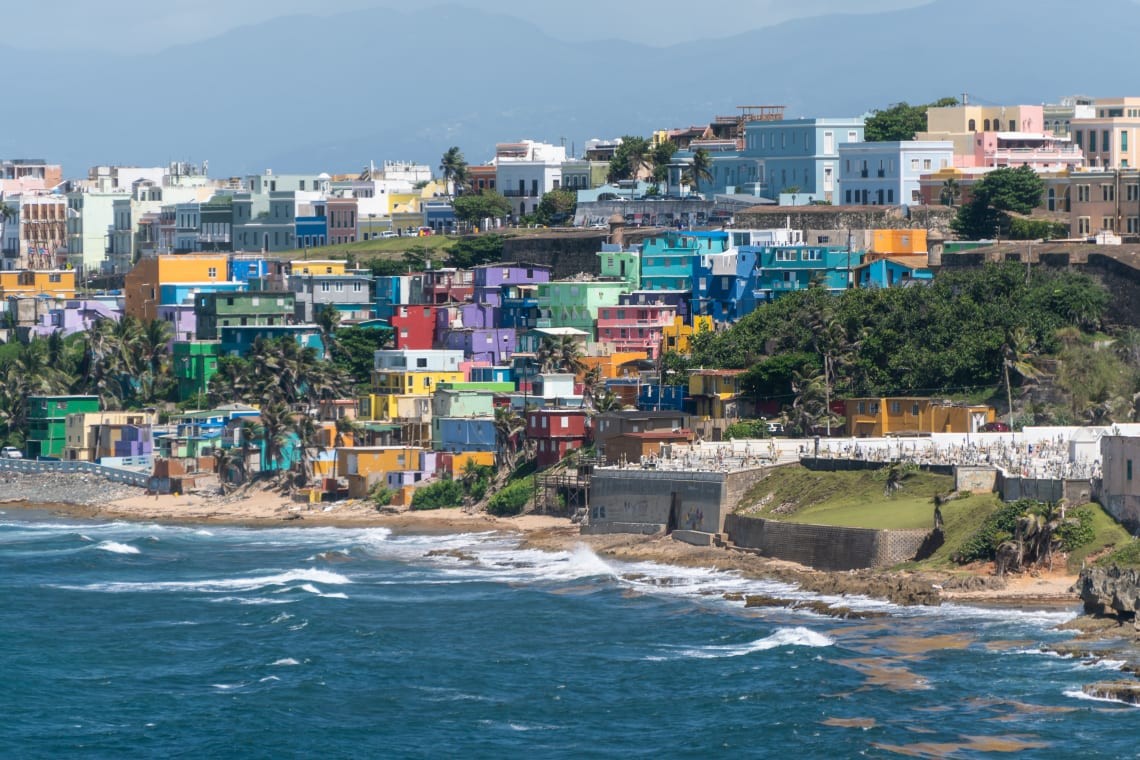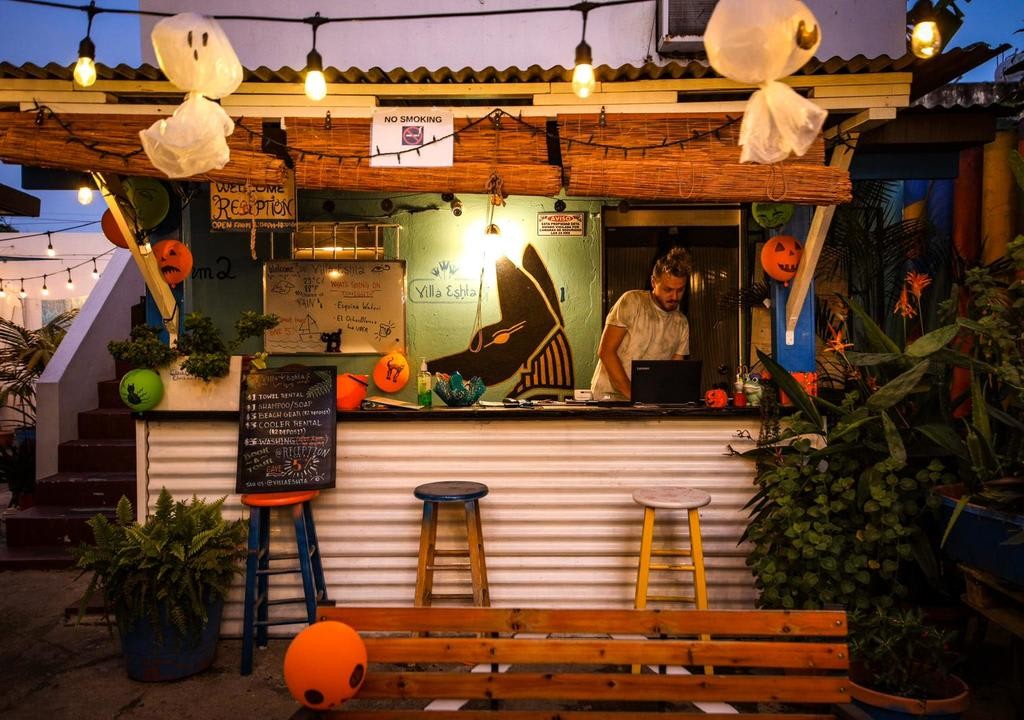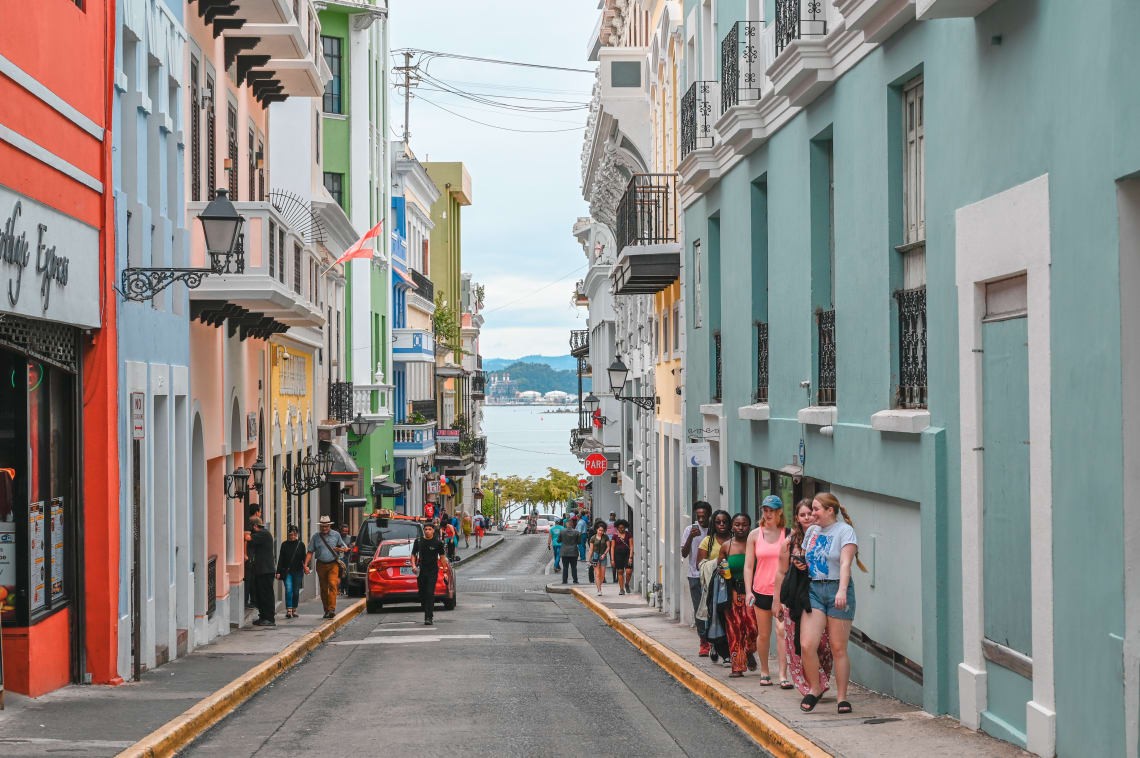Planning a trip to Puerto Rico? If you’re a non-U.S. citizen, understanding the entry requirements is crucial for a smooth journey and TRAVELS.EDU.VN is here to guide you. This guide clarifies passport necessities, visa regulations, and offers practical tips to ensure your Puerto Rican adventure is seamless. Discover the ease of traveling to this Caribbean paradise with confidence.
1. Understanding Puerto Rico’s Unique Status
Puerto Rico’s status as an unincorporated territory of the United States often raises questions about travel requirements. While it operates under U.S. laws and its residents are U.S. citizens, it’s not a state. This unique position affects entry protocols, particularly for non-U.S. citizens planning a visit. Understanding this distinction is key to preparing for your trip.
- Unincorporated Territory: Puerto Rico is under U.S. jurisdiction but not fully integrated as a state.
- U.S. Laws: The island adheres to U.S. federal laws, including immigration regulations.
- Passport Control: Entry requirements mirror those of entering the U.S. mainland.
2. Do Non-U.S. Citizens Need a Passport to Visit Puerto Rico?
Yes, if you are not a U.S. citizen, a valid passport is required for entry into Puerto Rico, aligning with standard U.S. entry protocols. This regulation applies regardless of your point of origin. Ensuring your passport is current and valid for the duration of your stay is the first step in planning your trip.
- Passport Requirement: Essential for all non-U.S. citizens.
- Validity: Ensure your passport remains valid throughout your visit.
- U.S. Entry Protocols: Puerto Rico adheres to the same entry regulations as the mainland U.S.
3. Visa Requirements for Puerto Rico Travel
Similar to entering the United States, visa requirements for Puerto Rico depend on your nationality. Check the U.S. Department of State’s website to determine if your country participates in the Visa Waiver Program (VWP). If not, you’ll need to obtain a U.S. visa before traveling. TRAVELS.EDU.VN recommends starting this process well in advance to avoid any delays.
- Visa Waiver Program (VWP): Check if your country is a participant.
- U.S. Visa: Required for citizens of non-VWP countries.
- Application Timeline: Begin the visa application process well in advance of your travel dates.
4. Essential Travel Documents for Non-U.S. Citizens
Beyond a passport and visa (if required), having certain documents can ease your entry into Puerto Rico. These might include proof of sufficient funds, a return ticket, and a detailed itinerary. These documents support your intention to visit temporarily and comply with immigration laws. TRAVELS.EDU.VN advises keeping copies of these documents separately from the originals.
- Proof of Funds: Bank statements or credit card information.
- Return Ticket: Evidence of your planned departure.
- Detailed Itinerary: A schedule of your activities and accommodations.
5. Understanding Customs and Border Protection (CBP) Procedures
Upon arrival in Puerto Rico, you’ll go through Customs and Border Protection (CBP), akin to entering any U.S. state. Be prepared to answer questions about your visit’s purpose, duration, and accommodation details. Cooperation and clear communication with CBP officers can streamline your entry process.
- CBP Inspection: Standard procedure upon arrival.
- Questions to Expect: Purpose of visit, length of stay, and accommodation plans.
- Cooperation is Key: Answer honestly and respectfully.
6. What If I Am a Legal Permanent Resident (Green Card Holder) of the U.S.?
Legal Permanent Residents (Green Card holders) do not need a passport to travel to Puerto Rico from the United States. Your Green Card (Form I-551) serves as proof of your legal resident status and is sufficient for entry. However, TRAVELS.EDU.VN suggests carrying your passport for international travel to and from the U.S.
- Green Card Suffices: No passport needed when traveling from the U.S.
- Passport for International Travel: Recommended for travel outside the U.S.
7. Traveling to Puerto Rico Via Another Country
If your trip to Puerto Rico involves transit through another country, verify the entry requirements for that country as well. Some nations may require a visa even for brief transit periods. TRAVELS.EDU.VN emphasizes the importance of planning your route meticulously to avoid unexpected complications.
- Check Transit Requirements: Each country has its own rules.
- Visa for Transit: Even a short layover may necessitate a visa.
- Plan Carefully: Ensure all legs of your journey are accounted for.
8. Health and Vaccination Requirements for Puerto Rico
Currently, there are no specific vaccination requirements for entering Puerto Rico. However, staying informed about the latest health advisories from organizations like the CDC and WHO is prudent. Ensure your routine vaccinations are up to date, and consider consulting your healthcare provider for personalized advice.
- No Mandatory Vaccinations: As of the current guidelines.
- Stay Informed: Check with CDC and WHO for updates.
- Routine Vaccinations: Ensure you’re up to date.
9. Travel Insurance: A Must-Have for International Travelers
Regardless of your nationality, travel insurance is indispensable. It can protect you against unforeseen events such as medical emergencies, trip cancellations, and lost luggage. TRAVELS.EDU.VN strongly recommends selecting a comprehensive policy that suits your specific needs.
- Essential Protection: Covers medical emergencies and trip disruptions.
- Policy Selection: Choose a plan that fits your needs.
- Peace of Mind: Travel with the assurance of financial protection.
10. Activities and Attractions in Puerto Rico
Puerto Rico offers a wide array of attractions, from the historic streets of Old San Juan to the natural beauty of El Yunque National Forest.
| Attraction | Description |
|---|---|
| Old San Juan | Historic district with colorful buildings, forts, and cobblestone streets. |
| El Yunque National Forest | Lush rainforest with hiking trails, waterfalls, and diverse wildlife. |
| Bioluminescent Bay (Mosquito Bay) | A bay filled with bioluminescent microorganisms that glow when disturbed. |
| Beaches (e.g., Luquillo, Condado) | Beautiful beaches offering various activities such as swimming, sunbathing, and water sports. |
| Arecibo Observatory | Famous for its large radio telescope, offering insights into astronomy and space science. |
 Colorful streets in Old San Juan, Puerto Rico
Colorful streets in Old San Juan, Puerto Rico
11. Local Laws and Customs in Puerto Rico
Respecting local laws and customs enhances your travel experience. While Puerto Rico follows U.S. federal laws, local customs reflect a blend of Spanish, African, and indigenous influences. TRAVELS.EDU.VN encourages travelers to learn about and respect these cultural nuances.
- U.S. Federal Laws: Apply in Puerto Rico.
- Cultural Influences: Spanish, African, and indigenous traditions.
- Respect Local Customs: Be mindful and appreciative of local culture.
12. Accommodation Options in Puerto Rico
Puerto Rico offers diverse accommodation options to suit various budgets and preferences. From luxury resorts to budget-friendly guesthouses, you’ll find choices that meet your needs. Booking in advance is advisable, especially during peak seasons, to secure the best rates and availability.
- Luxury Resorts: High-end amenities and services.
- Budget Guesthouses: Affordable and comfortable.
- Vacation Rentals: Apartments and villas for longer stays.
13. Transportation Options for Tourists
Navigating Puerto Rico is relatively easy with various transportation options available. Rental cars offer flexibility for exploring the island at your own pace. Taxis and ride-sharing services are readily accessible in urban areas. Public buses and ferries connect different parts of the island, providing affordable alternatives.
- Rental Cars: Ideal for independent exploration.
- Taxis/Ride-Sharing: Convenient in urban centers.
- Public Transportation: Buses and ferries for budget travelers.
14. Safety Tips for Travelers
Puerto Rico is generally safe for tourists, but exercising caution is always wise. Avoid walking alone in poorly lit areas at night, and secure your valuables. Be aware of your surroundings, and follow local advice to minimize risks.
- Avoid Isolated Areas: Especially at night.
- Secure Valuables: Keep belongings safe.
- Be Aware: Stay alert and trust your instincts.
15. What To Do if Your Passport Is Lost or Stolen
Losing your passport can be stressful, but acting promptly can mitigate the situation. Report the loss or theft to the local police and the nearest embassy or consulate of your home country. They can provide guidance on obtaining a replacement passport or emergency travel documents.
- Report Immediately: To police and your embassy.
- Embassy Assistance: Guidance on replacement documents.
- Keep Copies: Store copies of your passport separately.
16. Common Phrases in Spanish
Knowing a few basic Spanish phrases can greatly enhance your interaction with locals. Greetings like “Hola” (Hello) and “Gracias” (Thank you) are always appreciated. Even attempting to speak Spanish demonstrates respect and willingness to engage with the local culture.
- Hola: Hello
- Gracias: Thank you
- Por favor: Please
17. Best Time to Visit Puerto Rico
The best time to visit Puerto Rico is typically from mid-April to June. During these months, the weather is pleasant, and the crowds are smaller compared to the peak winter season. You’ll also find more affordable rates on accommodations and activities.
- Mid-April to June: Ideal weather and fewer crowds.
- Peak Season (Winter): Higher prices and more tourists.
- Hurricane Season (June to November): Be aware of potential storms.
18. Currency and Payment Methods
The currency in Puerto Rico is the U.S. dollar (USD). Credit cards are widely accepted in tourist areas, but carrying some cash is useful for smaller establishments and local markets. ATMs are readily available for withdrawing cash as needed.
- Currency: U.S. Dollar (USD)
- Credit Cards: Widely accepted in tourist areas.
- ATMs: Easily accessible for cash withdrawals.
19. Staying Connected: Mobile and Internet Access
Staying connected is easy in Puerto Rico with reliable mobile and internet access. Most hotels and cafes offer Wi-Fi, and you can purchase a local SIM card for your mobile phone for convenient data access. Check with your mobile provider about international roaming options.
- Wi-Fi: Available in most hotels and cafes.
- Local SIM Card: Convenient for data access.
- Roaming Options: Check with your mobile provider.
20. What To Pack for A Trip to Puerto Rico?
Packing for Puerto Rico requires consideration of the tropical climate and diverse activities. Light, breathable clothing is essential, along with swimwear, sunscreen, and insect repellent. Comfortable walking shoes are a must for exploring the island.
- Light Clothing: Breathable fabrics for warm weather.
- Swimwear: For beach and water activities.
- Sunscreen: Protection from the strong sun.
21. Can Non-Citizens Travel To Puerto Rico With A Criminal Record?
Entry to Puerto Rico for non-U.S. citizens with a criminal record is subject to U.S. immigration laws. Depending on the nature and severity of the crime, you may be denied entry. Consult with a U.S. immigration attorney for personalized advice.
- U.S. Immigration Laws Apply: Criminal record may affect entry.
- Type and Severity of Crime: Determines admissibility.
- Consult an Attorney: For guidance on your specific situation.
22. Traveling with Children: Specific Requirements
When traveling with children, ensure you have the necessary documentation to prove your relationship and legal guardianship. If traveling alone with a child, carry a notarized letter from the other parent granting permission for the trip.
- Proof of Relationship: Birth certificates or adoption papers.
- Notarized Letter: If traveling alone with a child.
- Passport for Children: Required for non-U.S. citizen children.
23. What Happens If My Visa Is Denied?
If your U.S. visa is denied, you’ll receive a letter explaining the reasons for the denial. You may be able to reapply, but it’s essential to address the issues that led to the initial denial. Consult with a U.S. immigration attorney for assistance.
- Denial Letter: Explains the reasons for denial.
- Reapplication: Possible after addressing the issues.
- Seek Legal Advice: Consult with an immigration attorney.
24. Can Non-Citizens Work or Study in Puerto Rico?
Non-U.S. citizens who wish to work or study in Puerto Rico must obtain the appropriate U.S. visa. A tourist visa does not allow you to engage in employment or academic activities. Contact the U.S. embassy or consulate in your country for visa application information.
- Tourist Visa Restrictions: Cannot be used for work or study.
- Appropriate Visa Required: Contact the U.S. embassy for information.
- Compliance with U.S. Immigration Laws: Essential for legal work or study.
25. Resources for Travel Information
- U.S. Department of State: For visa and passport information.
- Centers for Disease Control and Prevention (CDC): For health and vaccination guidelines.
- World Health Organization (WHO): For global health advisories.
- TRAVELS.EDU.VN: For comprehensive travel guides and tips.
26. What Are The Most Unique Experiences in Puerto Rico?
Puerto Rico offers a diverse range of experiences beyond the typical tourist attractions. Here are a few unique activities:
- Coffee Plantation Tours: Explore the island’s coffee-growing heritage with a tour of a local plantation.
- Cueva Ventana: Hike to this “window cave” for stunning views of the surrounding landscape.
- Festival Casals: Attend this classical music festival held annually in honor of Pablo Casals.
 Learn about Puerto Rico Entry Requirements
Learn about Puerto Rico Entry Requirements
27. How Do I Prepare for Hurricane Season?
If you’re traveling to Puerto Rico during hurricane season (June to November), it’s essential to be prepared:
- Monitor Weather Reports: Stay updated on local weather forecasts.
- Emergency Kit: Prepare a kit with essentials like water, food, and medication.
- Evacuation Plan: Know the evacuation routes and shelters in your area.
28. What is the Culture Like in Puerto Rico?
Puerto Rican culture is a vibrant mix of Spanish, African, and Taíno influences. Music, dance, and cuisine play a central role in daily life. The people are known for their warmth and hospitality, making visitors feel welcome.
- Music and Dance: Salsa, bomba, and plena are popular genres.
- Cuisine: Traditional dishes like mofongo and lechón are must-tries.
- Festivals: Numerous festivals celebrate local traditions and culture.
29. What Types of Beaches Does Puerto Rico Have?
Puerto Rico boasts a diverse coastline with beaches to suit every preference:
- Luquillo Beach: Calm waters and kiosks selling local food.
- Condado Beach: Lively urban beach with hotels and restaurants.
- Flamenco Beach (Culebra): Known for its turquoise waters and white sand.
30. What are the benefits of using TRAVELS.EDU.VN to book my trip to Puerto Rico?
TRAVELS.EDU.VN offers several advantages for booking your Puerto Rico trip:
- Expert Advice: Get personalized recommendations and travel tips.
- Customized Itineraries: Tailored to your interests and budget.
- 24/7 Support: Assistance throughout your trip.
Ready to experience the wonders of Puerto Rico? Let TRAVELS.EDU.VN help you plan your dream vacation. Contact us today at +1 (707) 257-5400 or visit our website at travels.edu.vn for exclusive deals and personalized service. Our office is located at 123 Main St, Napa, CA 94559, United States. Reach out via Whatsapp for immediate assistance.
 Exploring Puerto Rico
Exploring Puerto Rico
FAQ: Traveling to Puerto Rico as a Non-U.S. Citizen
1. Do I need a visa to enter Puerto Rico if I am not a U.S. citizen?
Yes, if you are not a U.S. citizen, you generally need a visa to enter Puerto Rico, depending on your country of citizenship and the purpose of your visit. Puerto Rico follows the same U.S. visa requirements as the mainland United States.
2. Can I use my U.S. visa to enter Puerto Rico?
Yes, if you already have a valid U.S. visa, you can use it to enter Puerto Rico, as it is a U.S. territory and follows U.S. immigration laws.
3. Is Puerto Rico part of the Visa Waiver Program?
Yes, Puerto Rico adheres to the U.S. Visa Waiver Program (VWP). If you are a citizen of a VWP-participating country, you can travel to Puerto Rico for tourism or business purposes without a visa for up to 90 days.
4. What documents do I need to enter Puerto Rico as a non-U.S. citizen?
You typically need a valid passport, a U.S. visa (if required), and any other documents required by U.S. immigration laws, such as an I-94 form (if applicable).
5. Are there any COVID-19 related entry requirements for Puerto Rico?
As of the latest updates, there are no specific COVID-19 related entry requirements for Puerto Rico. However, it’s essential to stay updated with the latest guidelines from the CDC and local authorities.
6. Can I extend my stay in Puerto Rico if I entered under the Visa Waiver Program?
No, you cannot extend your stay in Puerto Rico beyond the 90-day limit if you entered under the Visa Waiver Program. You must leave before your authorized stay expires.
7. What happens if I overstay my visa in Puerto Rico?
Overstaying your visa in Puerto Rico can have serious consequences, including deportation, difficulty obtaining future visas, and potential legal penalties under U.S. immigration law.
8. Can I travel to other U.S. territories with my U.S. visa?
Yes, if you have a valid U.S. visa, you can generally travel to other U.S. territories such as the U.S. Virgin Islands and Guam, subject to any specific entry requirements of those territories.
9. Do I need to go through customs when entering Puerto Rico from the United States?
No, if you are traveling directly from the United States to Puerto Rico, you do not need to go through customs, as it is considered domestic travel for U.S. citizens and residents.
10. Can I apply for asylum in Puerto Rico if I am not a U.S. citizen?
Yes, if you are physically present in Puerto Rico and fear persecution in your home country, you can apply for asylum, regardless of your immigration status. You will need to demonstrate a well-founded fear of persecution based on race, religion, nationality, membership in a particular social group, or political opinion.